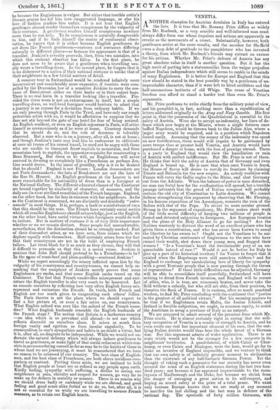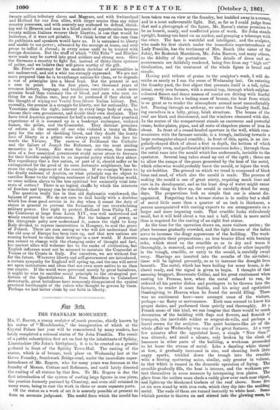VENETIA.
ANOTHER champion for Austrian dominion in Italy has entered the lists. It is true that Mr. Bonamy Price differs as widely from Mr. Roebuck, as a very sensible and well-informed man must always differ from one whose impulses and actions are apparently as erratic as the movements of a comet. Substantially, however, both gentlemen arrive at the same results, and the member for Sheffield owes a deep debt of gratitude to the pamphleteer who has invented a theory, from which Mr. Roebuck's friends may extract an excuse for his actions. Whether Mr. Price's defence of Austria has any great absolute value in itself is another question. But it has the high merit of putting into a statesmanlike form the vulgar prejudice against Italian independence which still seems to rankle in the minds of many Englishmen. It is better for Europe and England that this view should be stated in the best possible way by a gentleman of un- impeachable character, than if it were left to hired scribblers and the half-unconscious instincts of old Whigs. The cause of Venetian freedom can afford to stand a harder test than even Mr. Price's arguments.
Mr. Price professes to write chiefly from the military point of view, and his pamphlet is, in fact, nothing more than a republication of letters addressed originally to the Army and Navy Gazelle. His first point is, that the possession of the Quadrilateral is essential to the safety of Austria. Were she to accept an indemnity, her lines of de- fence which now begin at the Mincio, where a single fortress once baffled Napoleon, would be thrown back to the Julian Alps, where a larger army would be required, and in a position which Napoleon forced easily. Assuming r, that the money of the indemnity was spent on new fortifications, these would still require to be garrisoned by more troops than at present hold Venetia, and Austria would have purchased a danger at home, with the loss of prestige abroad. There is a party in England that would view the humiliation or ruin of Austria with perfect indifference. But Mr. Price is not of these. He thinks that with the safety of Austria that of Germany and even England is bound up. He is sure that when once Venice is freed, the House of Savoy will desire to rectify its frontiers by claiming Trieste and Dalmatia for the new empire. An unholy coalition with France will carry the Gallic eagles to the Rhine,'and shut Germany out from the Adriatic. When the balance of power is once disturbed, no man can fortel how far the conflagration will spread, but a terrible passage intimates that the greed of Italian conquest will probably reclaim the old city of Constantine to Latin dominion. We cannot forbear strengthening this argument by observing that Mr. Fleming, in his famous exposition of the Apocalypse, connects the ruin of the Sultan with that of the Pope. To revert to more secular ground. Strong in the argument of expediency, Mr. Price makes short work of the little moral difficulty of keeping two millions of people in forced and detested subjection to foreigners. Are European treaties and the plans of the Holy Alliance to go for nothing. ? Are the Italians wantonly to distrust the word of an excellent prince who has given them a constitution, and who has never been known to annul the liberties lie has sworn to ? Ought not the Venetians to be ani- mated by Christian sentiments of forgiveness to the men who have ruined their wealth, shot down their young men, and flogged their women ? " Is a Venetian's heart the irreclaimable prey of an un- quenchable hatred of race ?" Would it not be better for Italy to give up a part of its historical territory ? for Venice to forget that it existed when the Hapsburgs were still nameless robbers ? and for England to exchange her uncalculating love of liberty for sympathy with a great Teutonic people that is now passing through the throes of regeneration? If these little difficulties can be adjusted, Germany will be able to consolidate itself peacefully, Switzerland will have nothing to dread from French invasion, and England will be secure of allies, who, it is true, are commonly beaten, and never take the field without a subsidy, but who still are able, from their position, to threaten the flank of France. It is curious, after so much practical wisdom, to find Mr. Price concluding with the sentiment that "justice is the greatest of all political virtues." But his meaning appears to be that if we Englishmen retain Malta, the Ionian Islands, and Ireland in forcible subjection, we ought, in common equity, to assist the Austrians in using a province of Italy as an outpost. We are prepared to admit several of the premises from which Mr. Price starts. He is almost certainly right in saying that the mili- tary occupation of Venetia is a source of strength to Austria, and be even omits one real but important element of his case, that the out- lying Italian district would thus bear the whole brunt of a German war. But this argument admits of wider application. There is no state which would not be the stronger for a few outposts in its neighbours' territories. A quadrilateral, of which Calais or Cher- bourg, or even Calais and Boulogne, were the base, would go far to make an invasion of England impossible, and we venture to think that our own safety is of infinitely greater moment to civilization than the existence of any half-barbaric German Power. Yet the thought of taking such a guarantee for our security has never even crossed the mind of an English statesman during the last two hun- dred years; not because it has appeared impracticable to the coun- trymen of Marlborough and the Duke, but because we shrink from the danger of outraging a great nation in its self-respect, and buying an armed safety at the price of a total peace. We exist only because Europe knows that we are ready at any moment to sacrifice the last shilling and the last man in defence of the national flag. The spectacle of forty million Germans, with twenty million tributary slaves and Magyars, and with Switzerland and Holland for our firm allies, with larger armies than any other country possesses, and with scarcely any seaboard to defend, shriek- ing out to Heaven and man in a blind panic of apprehension because twenty million Italians recover their liberties, is one that would be ludicrous, if it were not pitiable. We think better of the race than its publicists and speakers would have us. It is untrained to liberty and unable to use power • educated by the scourge at home, and over prone to inflict it abroad; in every sense unfit to be trusted with foreign dominion. But the stuff of which "Old Fritz" and Blucher were made may be carved into good soldiers and strong men. Give the Germans a country to fight for, instead of thirty-three systems of police, and we believe they will prove worthy of the gift. Mr. Price's contempt for the modern doctrine of nationalities is not undeserved, and not a whit too strongly expressed. We are not more prepared than he is to exchange nations for clans, or to degrade a war of principles into a blood feud. But the present is not a case in point. In the first place, two thousand years of common history, language, and traditions constitute a much more genuine bond than visionary ties of blood, and men who care no- thing for an Italian race, may yet be pardoned if they shrink at the thought of wipinab out Venice from future Italian history. But, secondly, the present is a struggle for liberty, not for nationality. The Venetians claim the right, inherent in every large body of men, to choose their own government, and decide their own destinies. They have tried Austrian government for half a century, and their practical experience of it is summed up in a bankrupt exchequer, violated homes, the police, and the Concordat. They distrust promises of reform in the mouth of one who violated a treaty in Hun- Lgary the sake of shedding blood, and they doubt the hearty of liberty in a prince who always prays with his face to- wards the Vatican. The success of Ferdinand the Catholic and the failure of Joseph the Reformer, are the most abiding memories in Vienna. But were the case otherwise, the conces- sion of a free municipal government could never atone to freemen for their forcible subjection to an imperial policy which they abhor. The expediency that a free nation, or part of it, should suffer or be extinguished for the good of its more fortunate neighbours, has be- come the staple argument of the reaction. If we consign Venice to the deadly embrace of Austria, on what principle can we object to sacrifice Rome to the religious sentiment of half the Christian world, or some million slaves to the less spiritual but eminently vital inte- rests of cotton? There is no logical shuffle by which the interests of freedom and tyranny can be conciliated.
The question really lies in that old diplomatic watchword, the balance of power. We do not care to deal hardly with a doctrine which has done good service in its day when it meant the duty of states in general to prevent the formation of one overwhelming military power. Our right to protect Holland from Philip IL, or the Continent at large from Louis XIV., was well understood and wisely exercised by our statesmen. But the balance of power, as the retrograde party now understand it, means the right to keep Italy divided, to repress insurrection in Hungary, to seal the grave of Poland. There are men among us who will not understand that the old map of Europe has been torn up, and that new nations are coming forward to claim their heritage in a new world. If Austria can submit to change with the changing. order of thought and fact, her ancient allies will welcome her to the ranks of civilization, but English influence must not be misused to maintain the Concordat at Vienna or the Croats in Italy. For ourselves, we are without fear for the future. Wherever liberty and self-government are introduced, a certain sympathy for England will spring up, and the sun will never set upon institutions and ideas that are even more native to us than our empire. If the world were governed merely by great battalions, it might be wise to sacrifice moral principle to the strategical per- fection of the Quadrilateral. But from Marathon to Calatafimo downwards, great battalions have commonly disappointed the cynical practical forethought of the rulers who thought to govern by them. Perhaps we had better abide by our faith in liberty.































 Previous page
Previous page